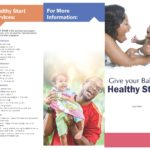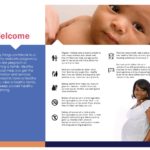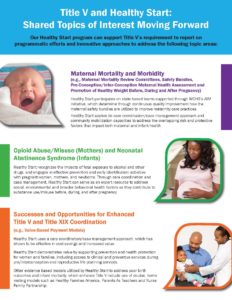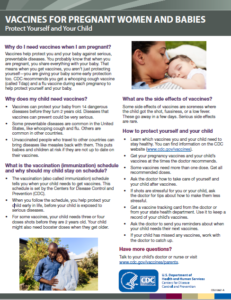Communications is a key part of the day-to-day operations and the long-term sustainability of Health Start programs. On this page, the HS EPIC Center provides tools and ready-made templates to help you reach your communications goals.
Ready-Made Materials
Mental and Behavioral Health Resources
Healthy Start Brochure: Download to use as is or customize with your program’s logo and contact information!
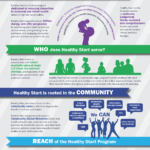

Healthy Start Infographic: One Page | Two Pages with Timeline
“Healthy Start Is…” Video: Without Audio Descriptions | With Audio Descriptions
Healthy Start Title V Value Proposition

Mom’s Be Sure To Take Care of Yourself Too! (Depression Awareness Card)
ACOG/CDC FASD Prevention Program
Toolkits
Healthy Start Recruitment & Retention Toolkit
The Healthy Start Recruitment & Retention Toolkit authored by Dr. Kimberly Leslie-Patton is designed to provide Healthy Start program directors, managers, outreach and case management/care coordination staff with a framework, tips and tools for developing a comprehensive and effective approach to recruitment and retention. The Toolkit will help programs to:
- Assess the cultural competence of the team for recruiting and retaining participants
- Develop an outreach plan to achieve enrollment goals
- Develop a retention plan/strategy
- Utilize the principles of Continuous Quality Improvement to strengthen and sustain recruitment and retention efforts
This Toolkit includes tips and tools that can be customized to fit your program’s unique recruitment needs and address outreach challenges. The tools can also enhance staff focus by providing the opportunity to self-reflect on what is working well and what needs to be modified to achieve outreach, recruitment and retention goals.
Download the full toolkit here!
Pre-Work Tools include tools that focus on assessment activities to gain a better understanding of staff needs and assets. These tools provide perspective on your Healthy Start program and how it fits within your community’s system of care, services and support.
- Taking a Pulse: Assessing Your Program’s Cultural and Linguistic Competence (download template)
- Painting a Portrait: SWOT Analysis (download template)
- Measuring Your Baseline: Enrollment Metrics (download template)
Recruitment Tools include planning tools that map out strategies for building relationships with community agencies, providers and organizations with which you plan to partner to best meet the needs of program participants, and who will be able to refer potential participants to your Healthy Start program. Educating community partners and potential participants with the most effective, tailored messaging will enhance efforts to reach the women, children, and families most in need of support.
- Find Your Starting Line: Working with Partners to Build a Referral Network (download template)
- Mapping Your Communication Roads: Engagement & Dissemination Planning (download template)
- Documenting Your Roadmap to Success: Creating Your Outreach Plan (download template)
- Making Your Pitch: Creating an Effective Elevator Speech (download template)
- Telling Your Healthy Start Story: Collecting Participant Testimonials
Retention Tools share a common theme of continuous quality improvement. Tools in this section focus on ensuring participants’ social networks are identified and program systems are reviewed through strategies including participant and staff input. This section also encourages the celebration of joint successes and acknowledging community partner contributions, all of which create positive energy and goodwill.
- Weaving a Safety Net: Documenting a Support Network (download template)
- Looking to the Future: Goal Setting (download template)
- Direct From the Source: Participant Interviews (download template)
Direct From the Source: Staff Interviews (download template)
Education & Fetal Alcohol Syndrome Disorders Toolkit
Healthy Start Communication and Outreach Toolkit
- Ten Steps to Communication Plan Form
- Sample Media Advisory: Local Healthy Start Takes on Breastfeeding
- Infant Mortality Customizable Press Release
- HS25 with a Local Perspective Customizable Press Release
Using Social Media for Health Awareness Months: July – September
- July: Minority Mental Health Awareness Month
- ePostcard 1: Facebook image | Twitter image
- ePostcard 2: Facebook image | Twitter image
- ePostcard 3: Facebook image | Twitter image
- ePostcard 4: Facebook image | Twitter image
- August: National Breastfeeding Month ePostcard images
- ePostcard 1: Facebook image | Twitter image
- ePostcard 2: Facebook image | Twitter image
- ePostcard 3: Facebook image | Twitter image
- ePostcard 4: Facebook image | Twitter image
- August: National Immunization Awareness Month and Week ePostcard images
- ePostcard 1: Facebook image | Twitter image
- ePostcard 2: Facebook image | Twitter image
- ePostcard 3: Facebook image | Twitter image
- ePostcard 4: Facebook image | Twitter image
- September: Infant Mortality Awareness Month ePostcard images
- ePostcard 1: Facebook image | Twitter image
- ePostcard 2: Facebook image | Twitter image
- ePostcard 3: Facebook image | Twitter image
- Social Media Toolkit for Healthy Start Programs
Using Social Media for Health Observances: October – December
Each month the Healthy Start EPIC center provides content and images that Healthy Start programs can use to promote health topics related to infant mortality prevention. Share this on your program social media pages or in other groups that would benefit from seeing this content.
- October: Sudden Infant Death Syndrome (SIDS) Awareness Month ePostcard images
- ePostcard 1: Facebook image | Twitter image
- ePostcard 2: Facebook image | Twitter image
- ePostcard 3: Facebook image | Twitter image
- ePostcard 4: Facebook image | Twitter image
- October: Child Health Day ePostcard images
- ePostcard 1: Facebook image | Twitter image
- November: National Prematurity Awareness Month and World Prematurity Day ePostcard images
- ePostcard 1: Facebook image | Twitter image
- ePostcard 2: Facebook image | Twitter image
- ePostcard 3: Facebook image | Twitter image
- ePostcard 4: Facebook image | Twitter image
- November: Great American Smokeout ePostcard images
- ePostcard 1: Facebook image | Twitter image
- December: National Influenza Vaccination Week ePostcard images
- ePostcard 1: Facebook image | Twitter image
- December: World AIDS Day ePostcard images
- ePostcard 1: Facebook image | Twitter image
Using Social Media for Health Observances: January – March
- January: Birth Defects Prevention Month ePostcard images
- ePostcard 1: Facebook Image| Twitter image
- ePostcard 2: Facebook image | Twitter image
- ePostcard 3: Facebook image | Twitter image
- ePostcard 4: Facebook image | Twitter image
- January: Folic Acid Awareness Week ePostcard images
- ePostcard 1: Facebook image | Twitter image
- February: National Children’s Dental Health Month ePostcard images
- ePostcard 1: Facebook Image| Twitter image
- ePostcard 2: Facebook image | Twitter image
- ePostcard 3: Facebook image | Twitter image
- ePostcard 4: Facebook image | Twitter image
- March: National Poison Prevention Week ePostcard images
- ePostcard 1: Facebook image | Twitter image
Using Social Media for Health Observances: April-June
- April: National Child Abuse Prevention Month ePostcard images
- ePostcard 1: Facebook Image| Twitter image
- ePostcard 2: Facebook image | Twitter image
- ePostcard 3: Facebook image | Twitter image
- ePostcard 4: Facebook image | Twitter image
- April: National Infant Immunization Week ePostcard images
- ePostcard 1: Facebook image | Twitter image
- May: Mental Health Awareness Month ePostcard images
- ePostcard 1: Facebook image | Twitter image
- ePostcard 2: Facebook image | Twitter image
- ePostcard 3: Facebook image | Twitter image
- May: Preeclampsia Awareness Month ePostcard images
- ePostcard 1: Facebook Image| Twitter image
- ePostcard 2: Facebook image | Twitter image
- ePostcard 3: Facebook image | Twitter image
- ePostcard 4: Facebook image | Twitter image
- May: National Alcohol and Other Drug-Related Birth Defects Awareness Week ePostcard images
- ePostcard 1: Facebook Image| Twitter image
- June: Men’s Health Week and Month ePostcard images
- ePostcard 1: Facebook Image| Twitter image
- ePostcard 2: Facebook image | Twitter image
- ePostcard 3: Facebook image | Twitter image
- June: National HIV Testing Day ePostcard images
- ePostcard 1: Facebook image | Twitter image

